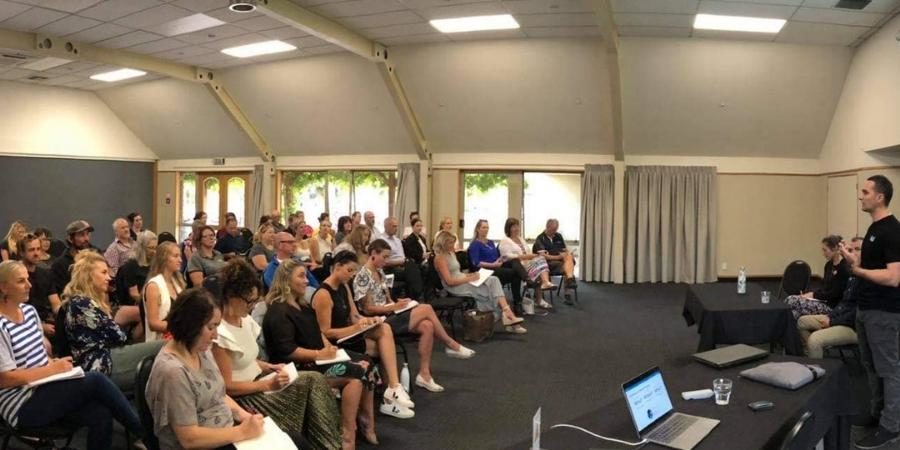I’ll be the first person to claim that I don’t have it all figured out. I’ve found five principles that have given me some success and I’ve managed to continue to build upon these to get to where I am now. These principles have given me a few international accolades, skills to build two 7 figure companies, features in a few popular media outlets, and even land a couple of spots on the TV. Not bad for someone who got fired from a 90-day trial six years ago for being the “wrong-fit and culturally ignorant”.
These principles are the accumulation of things I’ve stolen and bastardised from people far smarter than me that I wish I’d known earlier on in my career.
1. Plan For The Long Term
When I started I was myopic. I read the puff pieces and how-to articles that teach you about getting rich quickly (I even wrote a few myself) and thought if I imitate the rich and the famous I’d become rich and famous. The problem was that I read the articles, did what they said and only slightly deviated from the mean. The advice was sound and I learned new things but I didn’t end up with the world-changing results that the authors shared. Why?
The article I was reading was the highlight reel of that person’s journey. What I hadn’t seen were the years of prior work that had made that author the type of person who could write that article. I didn’t see:
– Past failures
– Past successes
– Mentors
– Family
– Friends
– Books read
– Education history
– Advisors
And the hundreds of other factors that led to that author’s success at that point in time. 99% of people do not burst onto the scene in a blaze of glory and astound the world with some magnificent feat of achievement. It’s an accumulation of skills that have compounded which then emerge as a victory. To illustrate this here is the combined revenue my companies made from 2017 until now.
2016 – Got fired
2017: $49 K
2018: $78 K
2019: $299 K
2020: $1.82 M
2021: $5.1 M
In my first two years of business, I couldn’t afford to live off the revenue I made. I juggled jobs and other part-time gigs to make it work. In the first three years, I was trading most of my time for an education in entrepreneurship. My tuition costs were failures, anxiety, humility, hustle, time, and money to learn how to build a product that people were willing to pay for. It took me three years to find something that people would pay me well for. My tuition had compounded and as a result, I was able to build something useful enough for our clients and customers.
I thought this would happen in 12 weeks in reality it was closer to 120 weeks. Whatever stage you’re at try to make long term decisions as they’ll prepare you for success far better than short term thinking ever will. This holds true with your relationships, education, and business.
Lastly, ignore the plaudits others are getting because your timeline will be different and not everyone can pass the marshmallow test but those who do reap twice the reward.
2. Take Action
At the beginning of something hard there is almost always a fear of failure, embarrassment and anxiety that sow the seeds of procrastination. Unfortunately starting or running a business is one of those hard things. For the majority of my first three years in business, I was often scared of what people would say when I went to promote myself.
This stopped me from doing anything for days at a time as I thought of better and more discrete ways to share what I was doing. Ultimately the solution to that problem was to take action.
Many of us believe that if we think about a problem for long enough it will take care of itself. We’ve all said at one point “I’m too (insert synonym for stressed or tired).” Then we’ve done the exact opposite of what we need to by waiting or worse finding some other vice to take our brain off of the hard thing staring at us. We then look at ourselves in the mirror and know that we could have done more and feel the impending guilt and work pile up.
The most successful people I’ve met all have a bias towards doing. The fastest way to figure out if something is going to work is by doing it. The results of the work you do give you evidence about the path you’re on and this allows you to adjust accordingly.
When you’ve taken the first step it becomes easier to take the second, third and fourth. My biggest successes in my career have always come from doing something that was scary at the time but became easier the more I did it.
The tortoise beat the hare because he was constantly taking action. Be the tortoise who doesn’t stop moving.
3. Cultivate Your Environment
Often we’re told to stay in our lane but what if your lane causes you to crash? The lane I had created for myself was dependent on what people thought of me. The thoughts of these people led me to do things that I thought was impressive to them but were not impressive to me. When you’re changing lanes you need to be around others who are going in the direction you want to head otherwise you get stuck in traffic.
You want to be around the people who are striving for the same goals because by nature humans are social animals. We’re memetic in our behaviour so if everyone around you is trying to become rich, practice good virtues and improve their lives you’ll fall into the same patterns. The same is true for the inverse, if people are happy with the status quo you’ll keep the status quo.
“You can’t be normal and expect abnormal returns,” said Standford Professor Jeffrey Pfeffer. Find the people who are doing things that sit outside of the median, befriend them and learn from them.
My career and these thoughts have come from people far smarter than me whether that’s in person or in spirit. The people you surround yourself with digitally, physically, and mentally all matter. It’s your job to pick the ones who are where you want to go and spend as much time with them as possible.
4. Build The Product Of You
This one is stolen straight from Naval Ravikant but I’ll share my version of it. At some point in your career, you will find a sweet spot where you’ll be placed to be the best at the niche you select.
This is slowly evolving for me as I find I’m in the midst of becoming a basic technical founder who is good at marketing, reading, copywriting, sales and importantly spotting niche opportunities in the paid media world. The combination of these things is product Kale and I’m marketing that right now through my writing, the product is still finding its best fit but it’s far better than when I started.
The goal is to find the thing in which people come to you for your unique solution. This will not come from standard tuition as anyone can buy the same tuition so it must be learned by taking action and developing your own insights. Every action you take is a vote for the identity or person you want to become but it’s also building the resume of things you’ve achieved until you find the intersection of things you’re the best at.
Eventually, the combination of these things will result in a company, service or product that only you can deliver.
A market is never saturated by a good product but a mediocre one has many copies. Make the product of you the best it can be through iteration, you’ll find the version that fits if you spend enough time on it.
5. Be Positively Objective
I learned the phrase “This happened and it is bad” is actually two impressions:
• The first “This happened” – is objective.
• The second “it is bad” – is subjective.
This means that everything that happens to us is up for interpretation. If we launch an app and users complain that the onboarding was too tough and leave, you’ve now got critical market feedback and data points to improve. Behind each objection, setback and failure is an opportunity to learn, improve and start again.
The biggest hindrance for me early on as a founder was that failure felt personal. I was hurt when someone said “this article is piss poor” or when a potential client said you’re not what we’re looking for. Today I look at each of these things as signals to iterate upon so that I can improve when I take my next shot.
The process for improvement requires putting aside your feelings and looking for objective, real feedback. Most people aren’t malicious and if the market is saying something doesn’t work they’re probably right.
Success and failure are two sides of the same coin. Make sure that whichever result comes up you learn from it.
This isn’t an exhaustive list of principles for success but I do believe they’re at the bedrock of building a better career. If you’ve got better principles, please share them in the comments as I’ll add them in for the next five years.


Comments: 3
Great principles K-Dog
Pingbacks and Tracebacks
[…] in the last few years but if you’re looking to start a business this article pairs well with my five principles on entrepreneurship. Let’s dive […]
[…] Most expensive lessons learned – holding onto people for too long, not trusting yourself and your instincts, not hiring […]